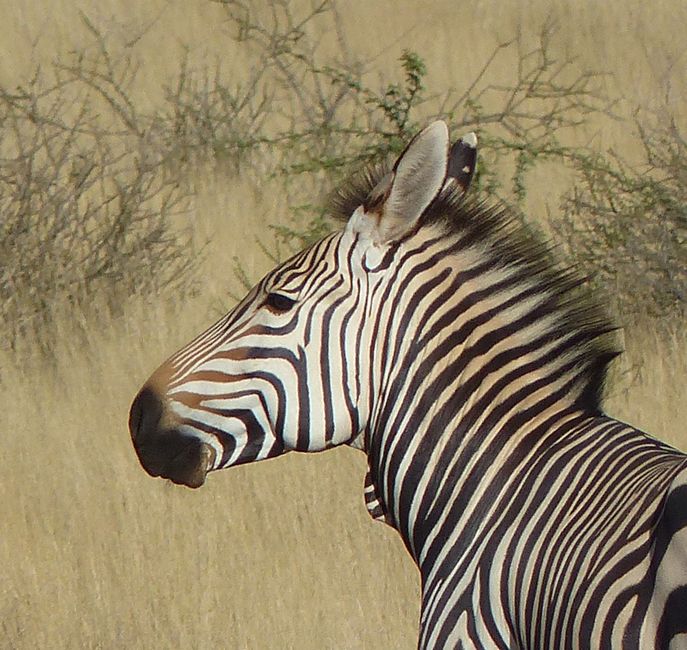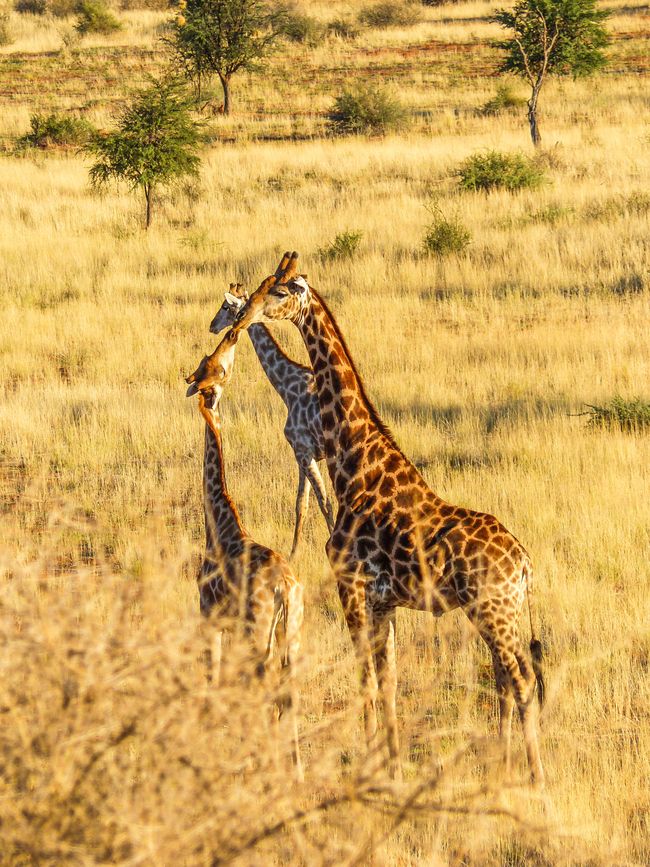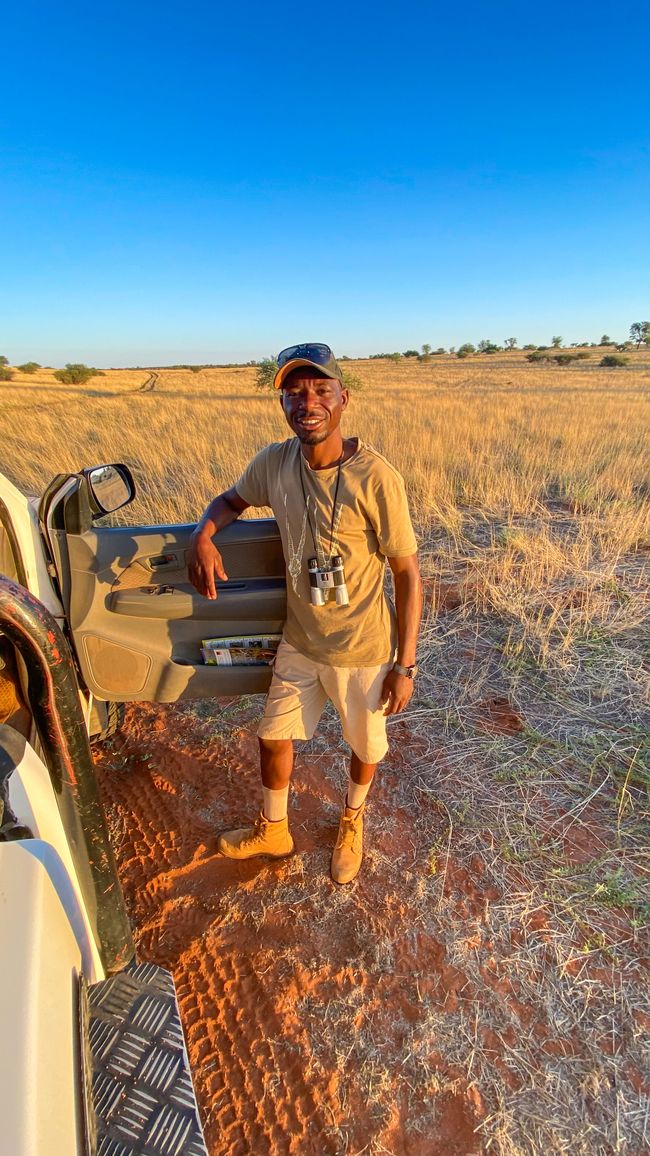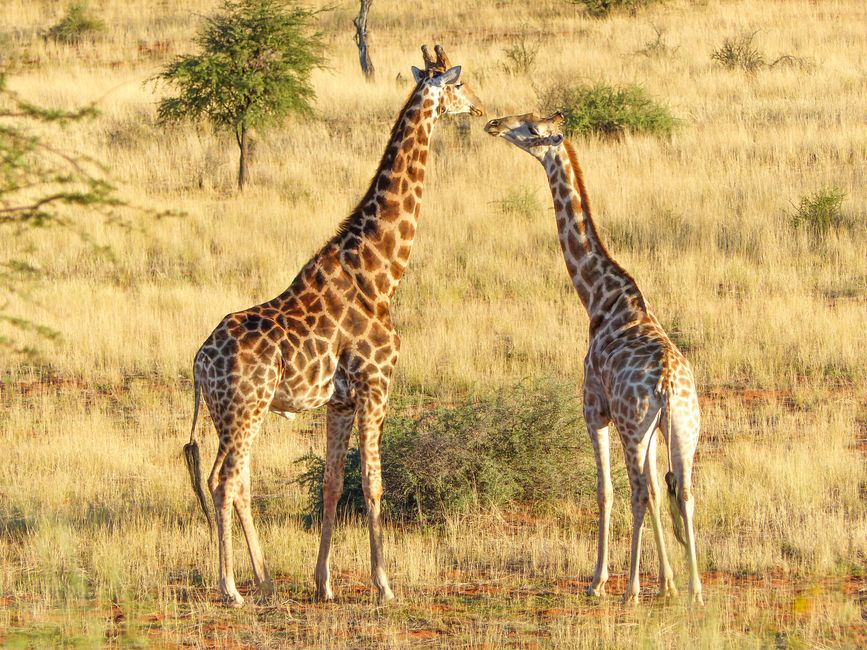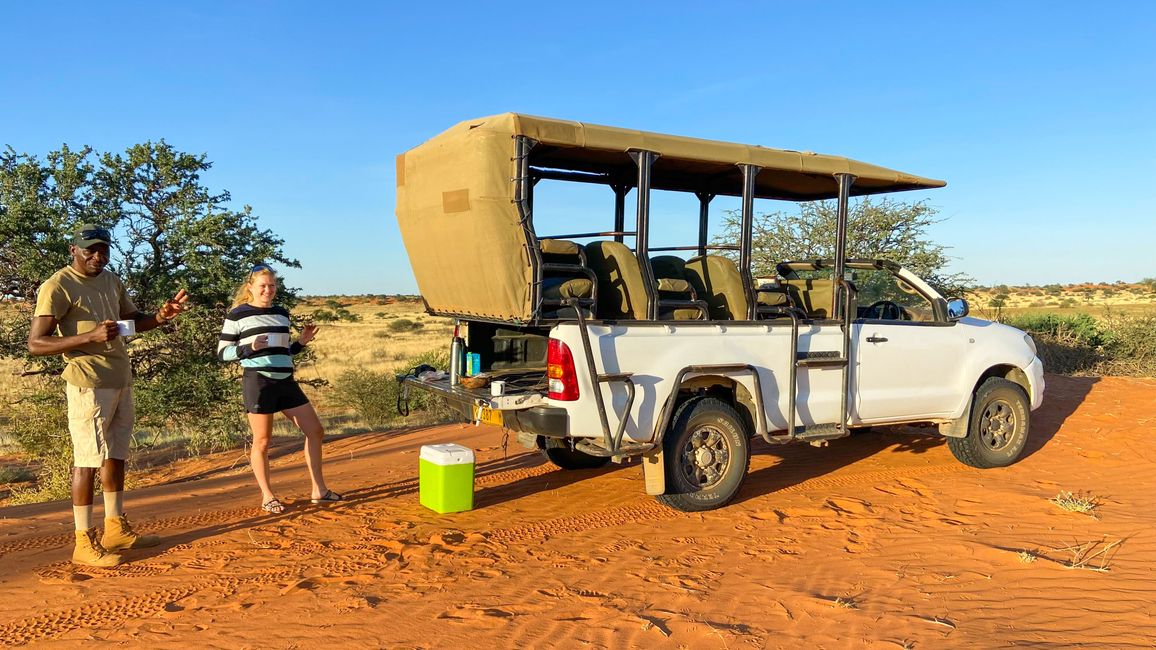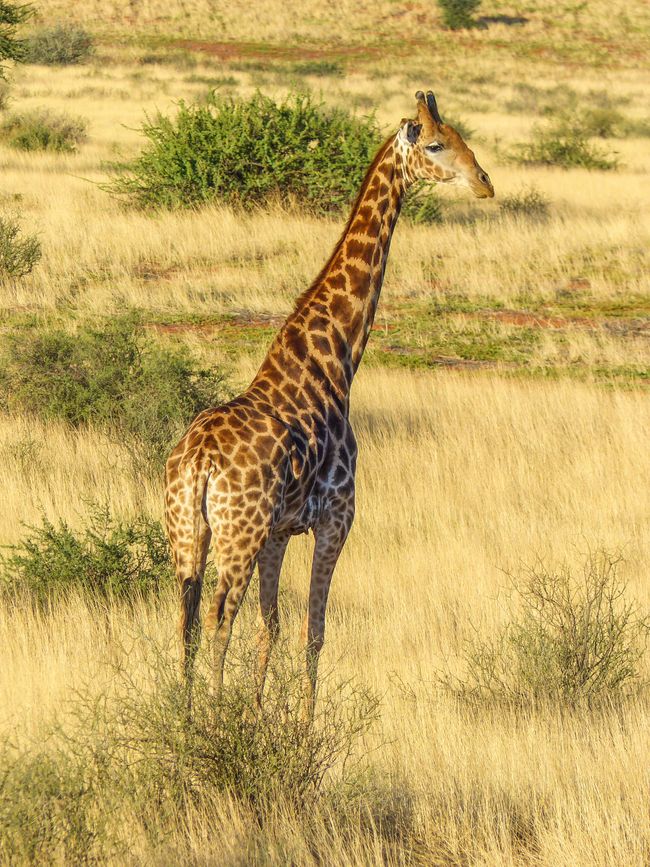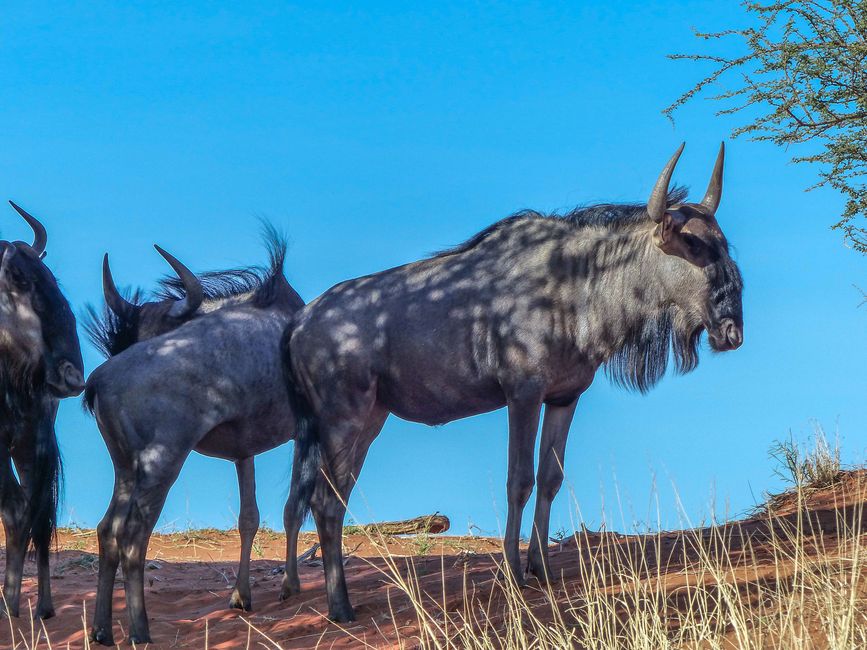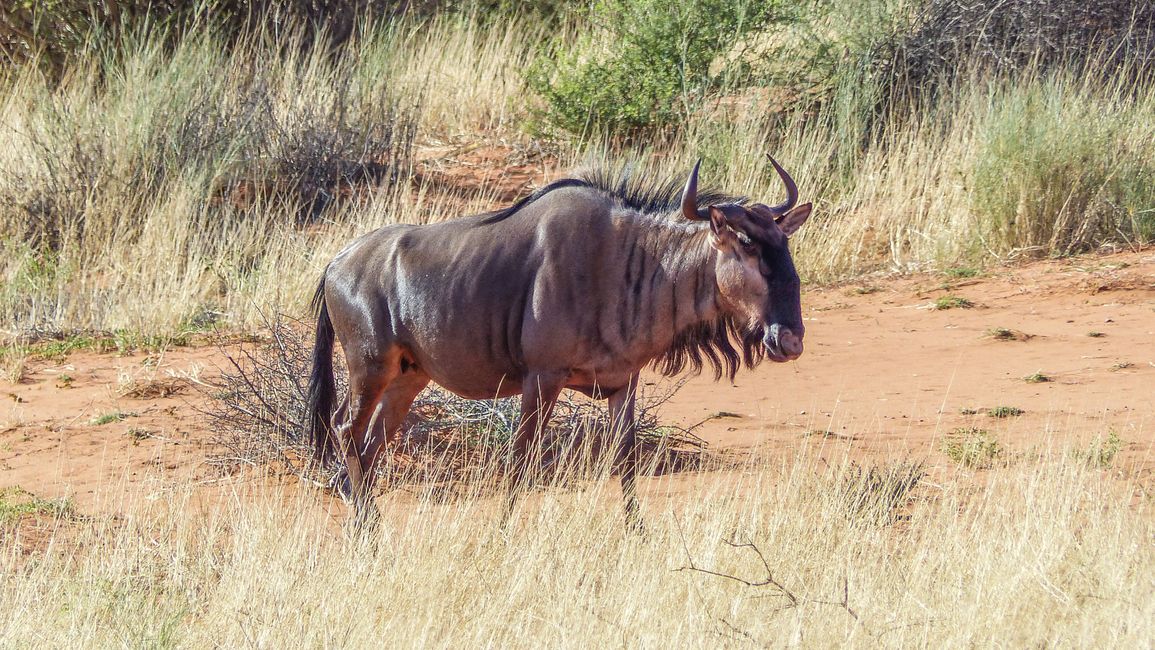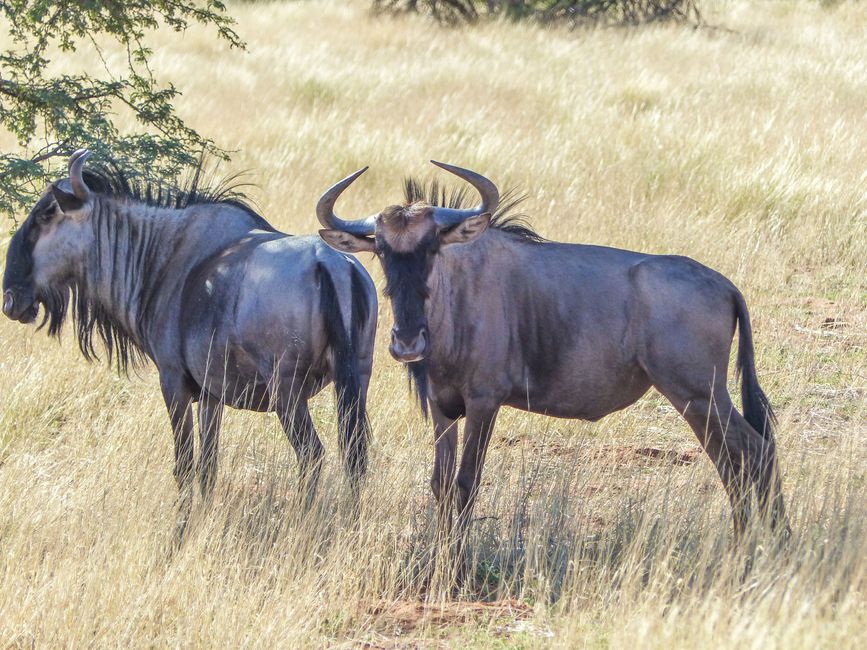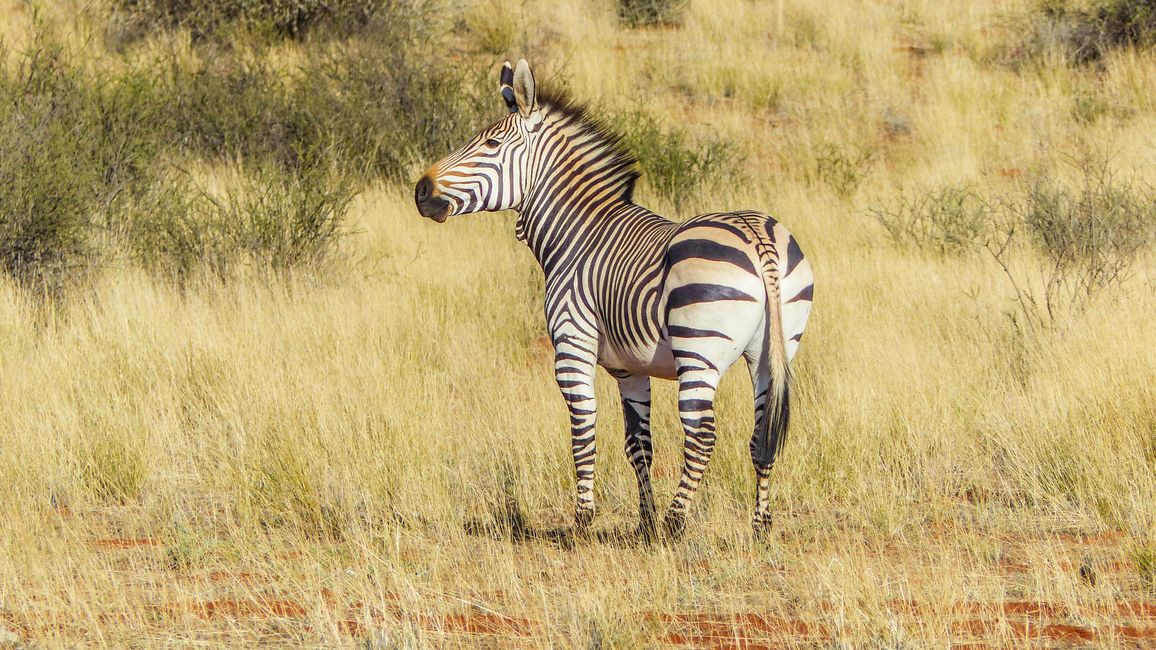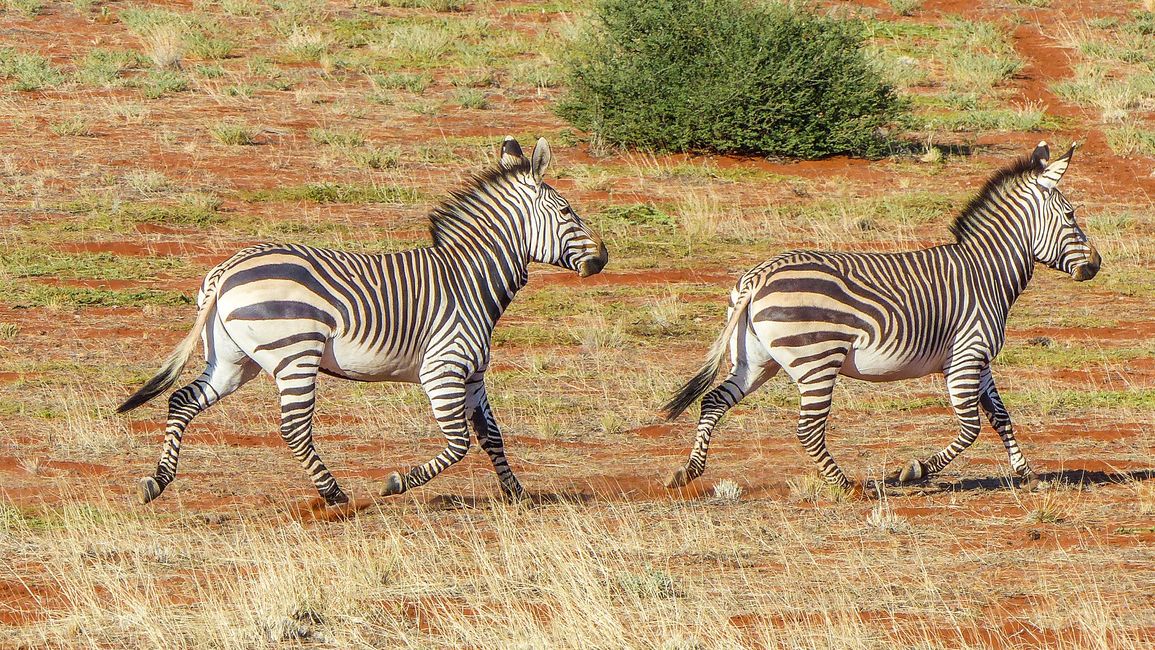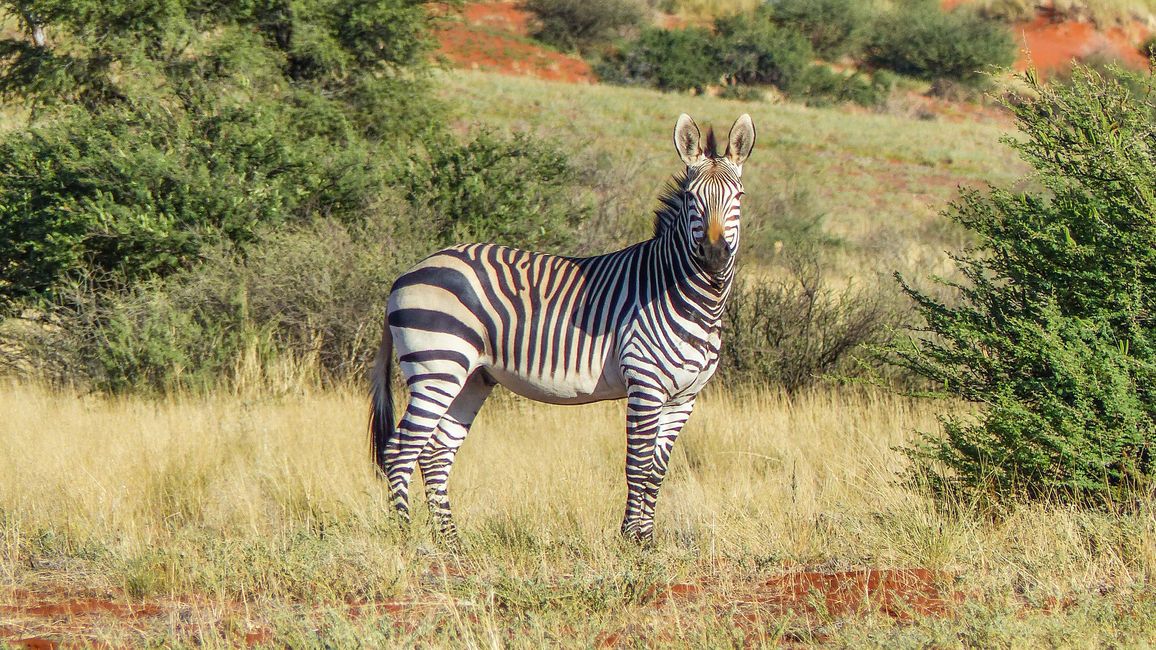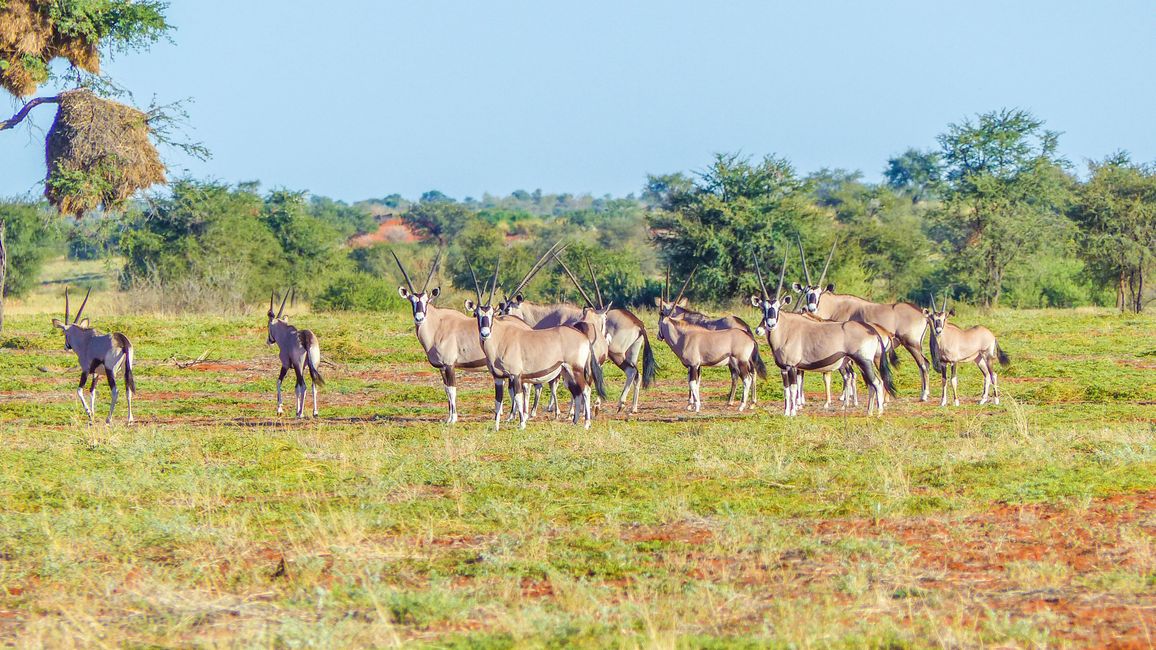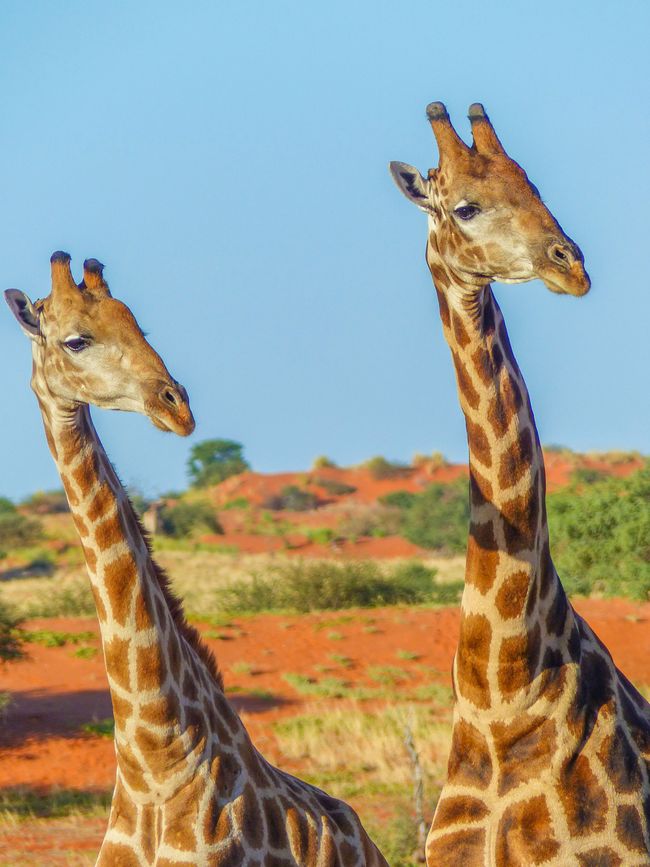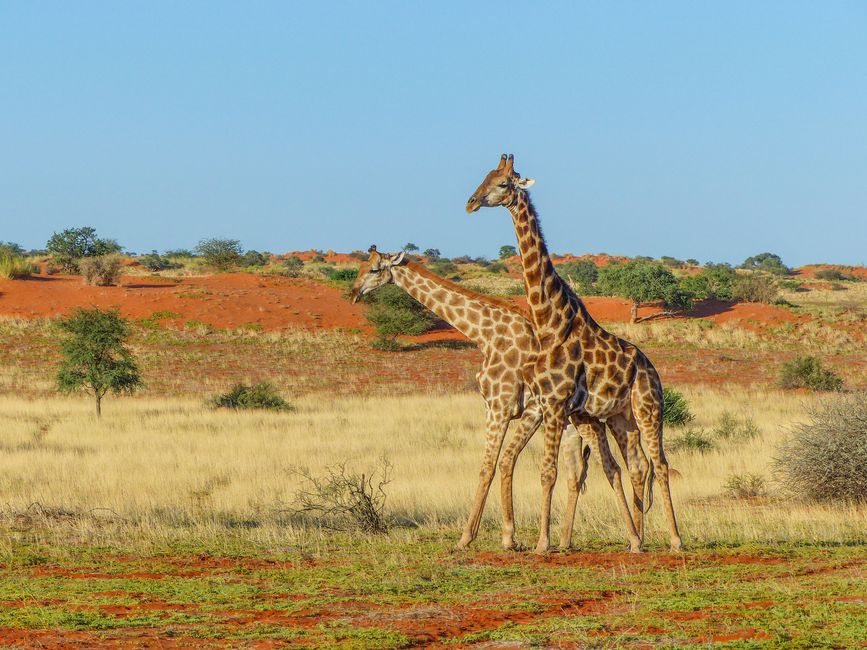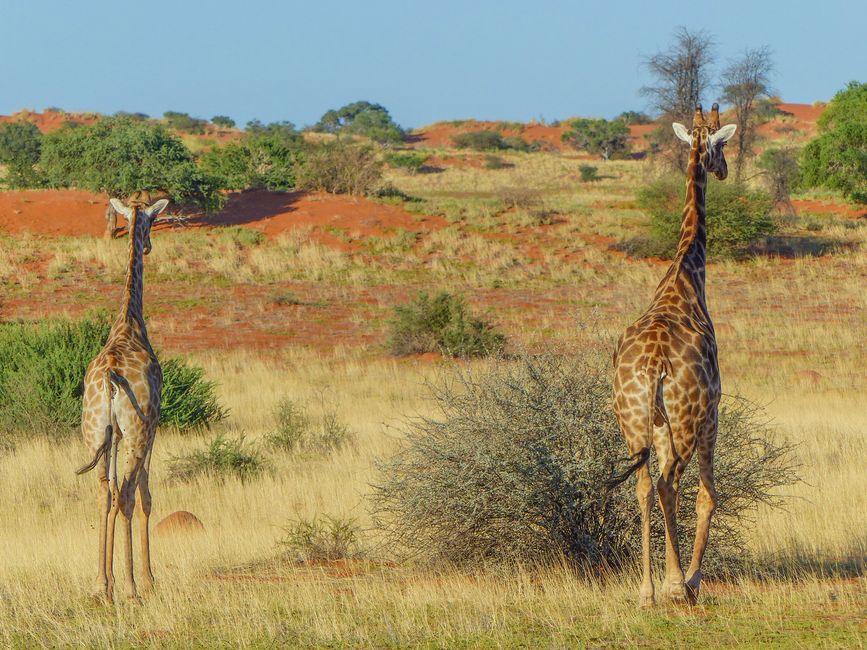ต่อสู้กับยีราฟ
ที่ตีพิมพ์: 15.02.2023
สมัครรับจดหมายข่าว
Tag 17, 13.01.23, Bagatelle Kalahari Game Ranch
How can a day start better than with a morning safari? The day before, we had arranged a private tour with Emanuel and at 6 o'clock a cheerful and happy guide awaited us at his car.
We "decide" to see the giraffes first, then the zebras, and finally the wildebeests. As a greeting in between, we take a look at the springboks, kudus, oryx, and anything else that is on its feet at this time.
We drive into a dreamy sunrise, see many antelopes, and are given an explanation of the life and work of these fascinating creatures at a revived termite mound.
Termites are a social order of insects that occur in warm earth regions. More than 2900 species are known. Many species have a white or yellow-white body color. Termites are usually between 2 and 20 mm long. A termite colony can have several million individuals and typically consists of three specialized castes: The sexually stunted and mostly blind workers are, among other things, fosterers of the brood, nest builders, and food providers. Nest guards are the soldiers with a large head and a strong jaw that protect the termite mound. The queen is the egg-layer of the termites, who has to be mated again and again and therefore lives together with a king. Termites prefer to feed on organic material such as wood, humus, or grass.
We continue through the beautiful landscape until we spot a giraffe in the distance. The advantage of a private ride is that we can decide at any time where and how we want to drive. After a few minutes, we stand on one of the red dunes and look down at the giraffe, or rather giraffes, as suddenly one appears behind every tree. We saw a total of 8, including two bulls fighting a bit away from the others. Emanuel tells us that the two always fight and nobody really knows why. The necks go up and down, entwine and free themselves again, they poke each other with their backsides, and the game starts all over again.
The perfect moment to take a coffee break and learn something about giraffes: Giraffes are the tallest and long-legged land mammals, reaching a height of up to six meters. Both the males and females have two cone-shaped horns on their heads. The fur color is light brown with dark brown spots. Each giraffe has a unique coat pattern, similar to a human's fingerprint. The giraffe's tongue can reach up to half a meter in length and is used to grasp leaves and branches. Giraffes sleep only a few minutes at a time, for a total of only a few hours a day, while standing. Most of the time, they doze off when they're not eating. In order to sleep and dream properly, the giraffe has to lie down and curl up. They can live up to 25 years.
While the two continue to fight, the rest of the family decides to go down the dune into the next valley. We follow with an impressive view and a cup of coffee in hand as these creatures move gracefully through the savanna.
It seems to be of no concern to the two fighting giraffes that their relatives are moving away. We decide to keep them company and drive closer. As soon as giraffes sense danger, a fight among themselves immediately stops, as a greater threat requires the attention of all, and they stand side by side.
Ok, we're really not dangerous now, but we definitely disturb them, which they show us by turning around together like "brothers in arms", showing us their hindquarters, and marching off.
Next on the agenda are the zebras, which we then spot less than 5 minutes later. We believe that someone has told them our itinerary, but we are highly delighted to encounter these mountain zebras.
All representatives of zebras are exclusively found in Africa, where they mostly inhabit open landscapes. There are three species: the Burchell's zebra (also known as the common zebra or painted zebra), the mountain zebra, and the Grevy's zebra (also known as the imperial zebra).
The Burchell's zebra is the most widely distributed zebra species in Africa. As the name suggests, mountain zebras occur in high-altitude areas of the Western and Eastern Cape provinces in South Africa and in the drier mountain regions of Namibia, and they are smaller than Burchell's zebras. No two zebras have the same stripe pattern, just like fingerprints of humans, the stripes of a zebra are unique for each individual. The Burchell's zebra is the national animal of Botswana and can be found on the country's coat of arms.
Second item of the day: Check. And off we go to the wildebeests.
The blue wildebeest, also known as the brindled wildebeest, a name that is not used so frequently anymore these days. Despite their appearance and physique, they are very agile animals. Blue wildebeests live everywhere in the open savannah of southern Africa. They are social beings and live in groups of 20 to 40 animals. Wildebeests are herbivores, have a slate-gray coat, sometimes with a touch of brown, a black tail, and a long, narrow head with horns that bend down and then up. Adult males can weigh up to 250 kg.
In contrast to buffaloes, I find them rather ugly, but that is really a matter of taste. But they definitely deserve to be noticed.
A few oryx and springboks later, we return to the camp where breakfast awaits us. Afterwards, we take care of rearranging the next accommodations and find out that the mechanic can also come to the lodge with the spare parts tomorrow, as they have their own lift for their vehicles and he can then be repaired there. A great relief, because otherwise we would have had to be towed, as continuing the journey would not have been advisable.
After everything was actually clarified, we learn that the spare parts will not arrive until noon and the mechanic cannot be there before 2 pm on Saturday. It is actually not a big deal, it just means that we definitely won't reach the border crossing to South Africa before 4:30 pm, which is when it closes at that time, and we have to postpone all our rearrangements by one more day.
Said and done, and the rest of the day is spent relaxing, sleeping, and reading by the pool.
สมัครรับจดหมายข่าว
คำตอบ
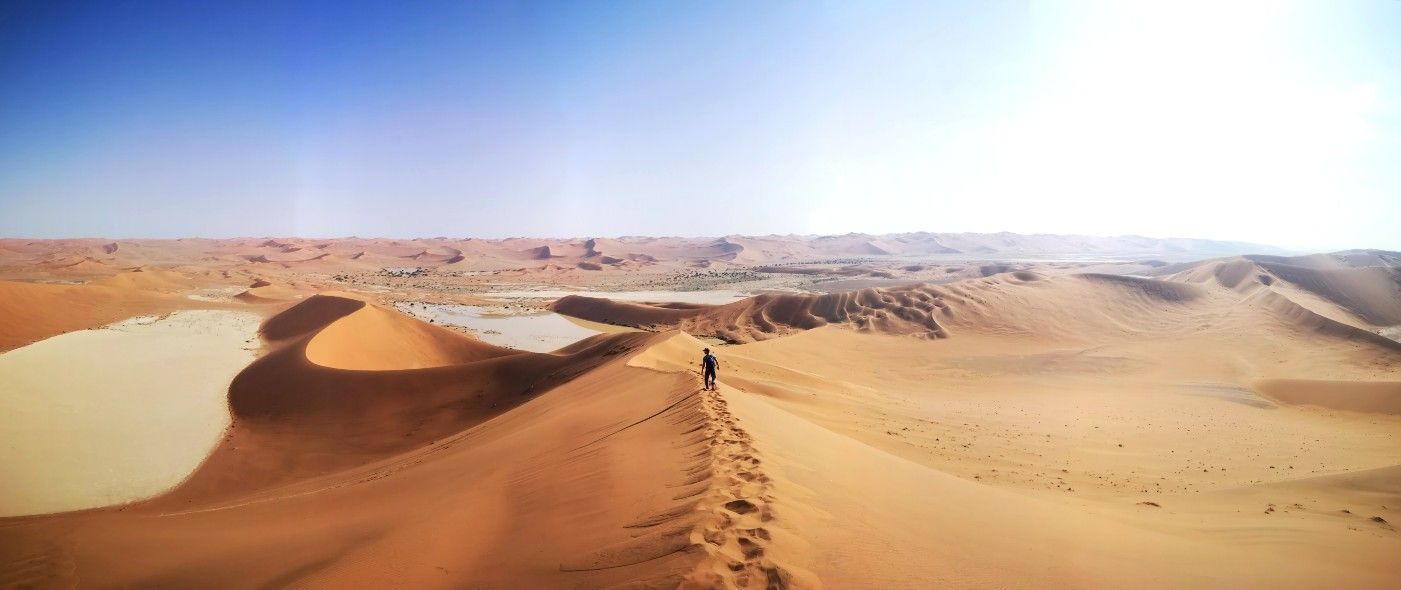
รายงานการเดินทาง นามิเบีย

